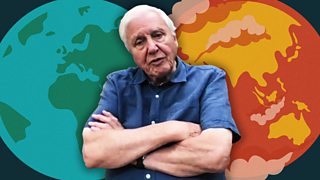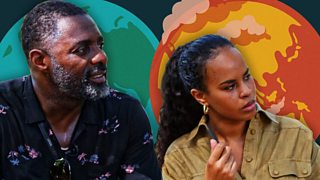Over 100 solutions to climate change we learned in the podcast
Feeling gloomy about climate change? Here's something to boost your optimism - over 100 solutions to the problem, as suggested by our What Planet Are We On podcast guests.
You can see the top 10 picks from What Planet podcasters Vic Gill and Matt McGrath here.
Protecting nature

The first episode featured an interview with legendary natural history broadcaster, Sir David Attenborough, who spoke about the need to live “more economically than we do”. Here are some of the possible solutions he put forward to helping solve the climate crisis:
- ‘We must learn to live more economically than we do’
- Governments need to work together rather than separately
- Countries should pay Brazil to not cut down their rainforests
- Creating sanctuaries to prevent overfishing will protect our seas
- We need to find a way to transport renewable energy cheaply over long distances
- Re-wilding
- Raise our awareness of how we are part of nature and live closer to it
Click here to listen to the full interview with Sir David Attenborough.

For YouTuber and former Nasa engineer Mark Rober, planting trees was his way of tackling climate change. These are the things we learned in episode five from him and Bryna Griffin, Head of Forests Programme at BirdLife International.
- Use the huge power of social media to galvanise youth into action
- Plant more trees, and a more diverse range of trees, in the right places
- Stop deforestation and protect the trees we already have
- Recognise biodiversity is key
- Make climate change and our role and responsibility part of people’s identity
- Better land management
- Offsetting schemes for carbon emissions you can’t reduce
- Look at Carbon Capture schemes
- Put a monetary value on nature
- Reduce our reliance on fossil fuels
Click here to listen to the full episode with Mark and Bryna.
Changes we can make as individuals

Episode one, part two was with Crystal Chissell, vice president of operations and engagement at Project Drawdown – a non-profit US organisation looking into existing climate solutions. These were some of her suggestions:
- Switch your lights to LED bulbs
- Eat a plant-rich diet
- Opt for alternatives to driving petrol cars when you can, such as an electric car
- Support land conservation
- Join others
- Embrace change: ‘Just because we have to do things differently, it doesn’t mean things will be worse. It might be in some cases, our situations improve’
- 'Communicate with those in power, those who are selling us products – let them know that you want them to solve these problems'
- 'Reconnect to our belief in the goodness of people when we feel discouraged'
Click here to listen to the full interview with Crystal.

One thing we can change as individuals, is how we talk to each other. This was explored in the episode with climate professors Lorraine Whitmarsh and Katherine Hayhoe about how to understand climate denial, and why people may feel negative or apathetic about change. Here were some things we learned:
- Have more conversations about climate change face to face
- Friends and family often have more power to make you change rather than any big celebrity
- Look at who you are voting for
- Focus more on high earners - who can have higher carbon footprints
- Ask yourself, ‘What does this mean for me?’ Then ask yourself what you can do about it
Click here to listen to the full interview with Lorraine and Katherine.

In part one and two of episode four, we heard about how we can make a big impact by reconsidering the things we buy and giving our possessions a longer lifespan.
Here were some of the things we learned from The Repair Shop’s Jay Blades, Selfridges chair Alannah Weston, Sara Divali from Hubbub and climate experts Prof John Barratt and Dr Nicole Koenig Lewis:
- Rent goods especially furniture or goods in fashion
- Share goods - like sharing cars
- Buy less and buy better, more durable products that can have more than one owner
- Find out where products are being made
- Compare products online
- Repair, reuse, upcycle and repurpose products to extend the lifespan
- Buy second hand
- The government could demand higher standards on products
- Carbon taxes on products
- Border carbon adjustments
Read the small print
- Don’t believe everything you read: What does 'we’re striving for highest sustainability goals’ – really mean? Look for proof to back up a company’s claim
- Buy into a brand not a product who are transparent about their overall sustainability practices
- Beauty products will often have green packaging or packaging featuring ‘nature’ including words like ‘natural’ while having no sustainability benefits or organic ingredients
- Compostable plastics are often used as a green alternative for packaging or things like coffee cups. The claim is misleading as the plastics would need to be sent to an industrial composter to biodegrade and most are thrown in normal waste
- Products are often labelled with ‘recyclable’, this means that they can in theory be recycled rather than they are in practice widely recycled
- Fashion labels will often produce sustainable capsule collection and while this is a brilliant step in the right direction, this is usually a very small part of the company’s overall collection and doesn’t mean that the brand is working towards ambitious sustainability goals
Click here to listen to the full interview with Jay Blades - and click here for the episode with Alannah.

It can sometimes be tricky to find hope amidst all the news about climate change. But in episode six, supermodel and businesswoman Lily Cole and teenage environmental campaigner Bella Lack explained how we can stay optimistic. These were some of their solutions that we can do as individuals:
- Recognise the power of people and the collective
- Work less, sleep more
- Recognise there’s no such thing as a perfect environmentalist and don’t berate yourself
- Fly less. Use the train more
- Move your bank account to an ethical bank
- Spend more on better quality goods and keep them for longer
- Consider reducing your intake of animal-based products such as meat and dairy
Click here to listen to the full interview with Lily and Bella.
Rethinking the food system

In episode two, we heard from Hollywood actor Idris Elba and his wife Sabrina Dhowre Elba, who are UN Goodwill Ambassadors for the International Fund for Agricultural Development. They shared some personal insights about inequality, the state of our global food systems and how we can all do something to help:
- ‘Each one, teach one’ – educate yourself and others about the issues
- Find better food storage solutions for rural farmers in developing countries, to combat food waste
- Increase the visibility of people who don’t have much and are impacted by climate change
- Fund and build irrigation systems which use less water
- Use climate-proofing solutions in vulnerable locations
- Develop more respectful relationship with food
- Grow your own
- Improve soil quality - what you put in the soil, you take from the soil
- Spreading a positive message rather than scaremongering
- Educate women and girls to help manage population growth
Click here to listen to the full episode with Idris and Sabrina.
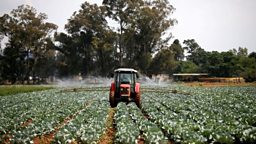
In part two of our episode on food, we heard from Indra Thillainathan, an agriculture and land use analyst at and Dr Rosemary Green from London School of Hygiene and Tropical Medicine. These were some of the suggestions we heard in the episode:
- Think about eating healthily by increasing your intake of lentils, chick peas and peas which are good proteins
- Consider reducing the amount of meat and dairy you consume. Could you try vegan for one meal a day, or switching to a meatless meat? And if you do eat animal products, try buying better quality.
- Try choosing local produce
- Swap one thing a week in your weekly shop for a sustainable item
- Grow and eat seasonal food
- Reduce household food waste
- Reduce waste in food production supply chain
- Increase the amount of fruit and veg grown in the UK and import less
- Free up 20 percent of our pastureland in the UK for re-wilding
- Diversify crops
- Restore more peatland
- Improve the diets of cattle so they burp less
- Give farmers a subsidy for providing environmental goods
- Government awareness campaigns and better education
- Better labelling on foods to show the carbon footprint
- Standardised metrics on the emissions intensity of foods
- Incentivise shoppers to change their behaviour (like with the 5p plastic bag charge)
Click here to listen to the full episode with Indra and Dr. Rosemary.
Transforming industry and the economy

Following the disruption of the pandemic, we wondered - can our future be rebuilt as both prosperous and green? We put the question to economists Kate Raworth and Professor Rebecca Henderson. Here are some of their suggestions for how it could be achieved:
- Adopt a circular economy
- Make more car lanes into bike lanes
- Retrofit houses with insulation
- Put solar panels on every roof
- Changing our transportation systems
- Rebuild our power plants
- Use technologies to empower workers to run own businesses from home
- More family owned enterprises
- More modular design
- Open source design
- Labels saying what type of plastic it is and how it should be recycled
- Urban mining
- Introduce more local community owned wind turbines
- Switching energy provider
- Wearing warmer clothes (add: instead of turning up the heating)
- Introduce right to repair laws
- Take corporate money out of governments
- Consumer power - saying we won’t buy goods if we can’t repair them
- Employees telling their own companies to recycle or repair
- More government policies which make fossil fuels very expensive and favour green energy.
- Move your bank account to an ethical bank
- Strengthen our democracy and civil society
Click here to listen to the full interview with Kate and Rebecca.

In order to change the economy, businesses need to be on board. So the What Planet team asked Crowley Carbon founder Norman Crowley and Sian Sutherland, co-founder of A Plastic Planet, how it might be possible to ‘rethink business as usual’. Here were some of their thoughts:
- Make plastics from seaweed and hemp
- Permanent packaging
- Buy electric cars instead of petrol and diesel
- Consider eating less meat, or switching to meatless meats
- Educate women and girls
- Stop buying goods with refrigerant F gases in them
- Change the way we heat our homes
- Improve public transport
- Move to 100 percent wind and solar renewable energy
- Stop wasting 50 percent of energy in buildings
- Reconnect with nature
- Put a price on carbon
- More equality across the globe
- The role of technology advancements in carbon capture and storage
- Less food waste
- Rethinking design
- Reframe what’s valuable and what we consume
- Recognise small wins can make a difference
Click here to listen to the full interview with Norman and Sian.

The music industry is a significant part of the UK economy, so we spoke to Edwin Congreave from Foals (pictured on keyboard) about the climate impacts of touring. Here were his thoughts on how touring may need to change in order to lessen carbon emissions:
- Bands to tour differently, not flying on world tours in the same way
- Watch more music online
- Use green energy at venues, gig and festivals
- Bring fewer people on tour and hire more local, tech talent
- Better public transport to out of town venues so people don’t have to drive
- More city centre big venues
- Freight gig kit rather than fly it
Click here to listen to the full interview with Edwin.

In the same episode as Edwin, the What Planet team spoke to Chiara Badiali from Julie’s Bicycles. She focuses on getting the music industry up to speed when it comes to sustainability. These were her solutions:
- Commit to action by writing down an environmental policy or a commitment action plan.
- Measure and report your business carbon footprint - such as energy bills and travel - so that the industry is accountable and transparent
- Work with experts from outside your industry to keep learning and to help make key decisions
- Switch to renewable energy and use less of it
- Consider shifting your savings and pensions into green investment funds
- Make it easier for audiences and fans to do the right thing, such as providing reusable cups at venues or bundling festival tickets with coach tickets to encourage public transport use
- Think about different kinds of business models - whether that's more live streaming, more residencies, or slower touring
- Speak out and be brave, even though we'll get accused of hypocrisy by people who do not want to engage with what we're saying
- Use your industry’s voice to ask for better policies from government
- Find environmental campaigns and charities and causes to support
- Support artists who speak out: So often this is all just put on the shoulders of artists. But to really empower their voices, the industry itself needs to come together to act.
Click here to listen to the full interview with Chiara.
Politics and leadership
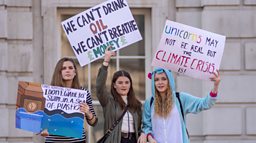
One of the world’s most influential voices on climate is former UN climate chief Christiana Figueres – who with political strategist Tom Rivett-Carnac, helped bring together world leaders for the historic . Here are her thoughts on how individuals can influence political leaders around the world.
- Use citizen assemblies to advise governments
- Don’t leave it up to federal governments to solve climate change - all human beings need to be on board
- More litigation cases can force governments to change laws
Click here to listen to the full interview with Christiana and Tom.
We also heard from some of the world’s leading young activists; Jamie Margolin, an American climate justice campaigner and the co-executive director of Zero Hour; Vanessa Nakate, a Ugandan climate justice activist and founder of the Rise Up Movement; and 15 year-old environmentalist, Holly Gillibrand, who was one of the youngest climate activists in the UK when she first began school strikes in the Scottish Highlands where she lives. They gave some thoughts on how to make change happen:
- Question your employers about their practices
- Hold corporations to account
- Become allies with your co-workers and push for change
- Find likeminded people online
- Protect yourself as much as you can on social media. Ignore and block trolls
- Take whatever it is you are good at - like engineering - and apply it to the climate crisis
- Act as citizens not consumers
- Address the system itself
Click here to listen to the full episode.
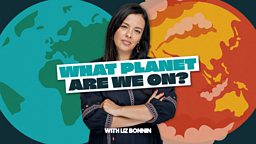
So there's the list! We hope you've found it useful. And if you've enjoyed reading this, why not give the podcast a try? There's many ideas and discussions about the climate for you to get your teeth into. Click here to listen on ΒιΆΉΤΌΕΔ Sounds.
You can also see our 10 favourite climate solutions, as picked by What Planet Are We On? podcasters Vic Gill and Matt McGrath.
Will you be making any climate changes in 2021? Let us know using the hashtag #WhatPlanetPodcast on social media, or email what.planet@bbc.co.uk.

